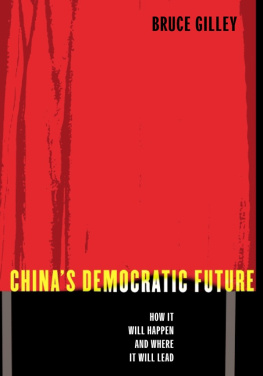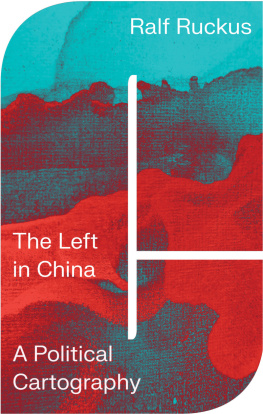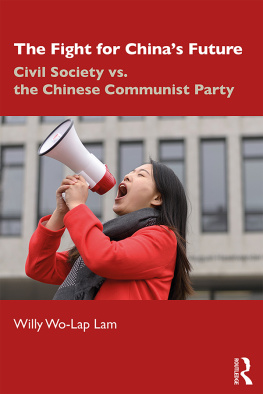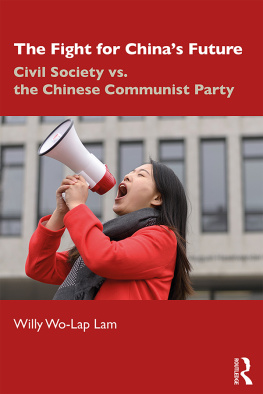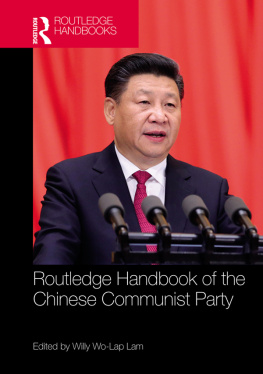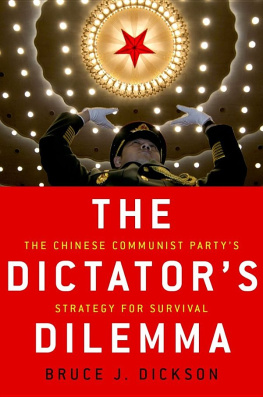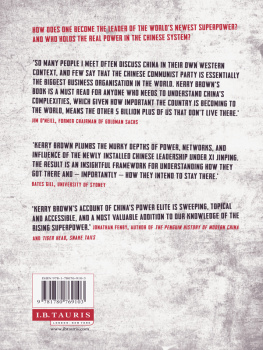Columbia University Press
Publishers Since 1893
New York, Chichester, West Sussex
cup.columbia.edu
Copyright 2004 Columbia University Press
All rights Reserved
E-ISBN 978-0-231-50215-3
Library of Congress Cataloging-in-Publication Data
Gilley, Bruce, 1966
Chinas democratic future : how it will happen and where it will lead / Bruce Gilley.
p. cm.
Includes bibliographical references and index.
ISBN 0-231-13084-8 (cloth. : alk. paper)
1. DemocracyChina. 2. ChinaPolitics and government1976 I. Title.
JQ1516.G55 2004
A Columbia University Press E-book.
CUP would be pleased to hear about your reading experience with this e-book at .
References to Internet Web Sites (URLs) were accurate at the time of writing. Neither the author nor Columbia University Press is responsible for Web sites that may have expired or changed since the articles were prepared
The derrick is positioned just below the rostrum of the Gate of Heavenly Peace in central Beijing. It is a brilliant autumn day. The hydraulic arm and the cables have been secured and checked by the 20-man crew. Crowds stand in awe in the vast Tiananmen Square below, as if they are about to witness a religious event.
At 10 AM sharp, the signal is given and, accompanied by the barking orders of a foreman, a one-ton, 21 foot by 16 foot glass fiber-reinforced plastic painting begins its descent from the rostrum face. It has been quite some years since Mao Zedong stood here before 300,000 people on October 1, 1949 and announced the founding of the Peoples Republic of China. Now his portrait, hung hastily just a few hours before the founding ceremony, is being removed. Chinas Communist Party has fallen from power and Maos portrait is an anachronism.
Maos face seems to wince with each jerk of the cables as the portrait descends. There is an apprehension in the crowd, as if the profanation of the sacred object might unleash violence from the heavens. But there are no earthquakes, no fireballs. With Maos enigmatic smile secured in the back of a flatbed truck, the crowd disperses with little fanfare. In a few days time, Maos tomb in the center of the square will be removed to a museum in his hometown far away in Hunan province. Another dynasty has come and gone.
It has been a month since a group of reformers in the senior ranks of the Chinese Communist Party (CCP) seized power and declared plans to introduce democratic elections, and events have been unfolding quickly. A national constitutional convention is planned for November where more than 5,000 delegates appointed by the interim leadership will attempt to point their country in the direction of a functioning democracy. The Great Hall of the People is buzzing with preparations for the meeting. Across the Avenue of Eternal Peace, the CCPs vacated Zhongnanhai leadership complex has been opened to the public, which throngs through its lakes and villas in fascination.
The end of communist rule and the embrace of democracy in China will be one of the most important events of the twenty-first century. It will mark for the world the virtual end of a remarkable yet tragic experiment in utopianism known as Marxist-Leninism. It will also represent for a fifth of mankind, the largest part of that still not living under democracy, the beginning of the long road to freedom.
Since coming to power in 1949, the CCP has turned China from a poor and benighted nation into a moderately well-off and increasingly influential one. Yet the CCP has failed to keep pace with the changes that have overcome Chinese society since agreeing to step aside from its daily life in the late 1970s. It remains a singular fact that the worlds biggest and one of its most dynamic and culturally rich societies continues to be ruled by a corrupt and repressive dictatorship. Yet the balance of power for and against the CCP has shifted. This shift will likely bring an end to its rule in the early decades of this century, and an end to Maos vigil on the Gate of Heavenly Peace.
This book is an attempt to peer into the future of Chinas pending constitutional transition. It is not my intention here to make blithe assertions that all is well, or will be, with the democratic project in China. That project, although faultless in appeal, is beset with difficulties in practice. But it is my intention to show that in the early twenty-first century, after nearly a hundred years of frustrating and tragic attempts to create a workable political system following the overthrow of the last dynasty, the Qing, the prospects for the creation and maintenance of a democracy in China are now better than ever. We can already envision how it will happen and where it will lead.
This book, then, offers hope to a nation still reeling from trauma of the 1989 Tiananmen Massacre. It challenges the resignation and disillusion that have gripped public life in China, noting the objective conditions that now favor a democratic transition.
The book is divided into three parts. The first part deals with the crisis of the communist state. After a brief summary of thematic ().
I do not, in this forward-looking narrative, attempt to guess which long-term factors will prove singularly decisive. Most scholars writing on China point to the growing pluralization of social interests, political corruption, and international norms as critical. This is a reasonable view. But like all advance looks at history it will no doubt be challenged after the fact by revisionists who point to less well-known issues like historical memory, growing notions of justice, and regional fragmentation. To preempt those debates I adopt an all-inclusive approach here. I am less interested in staking my claim on why democratic transition will happen than on how.
In the second part, I deal with the short-term process of democratic transition, essentially how the CCP will be removed from power and the existing political system replaced by a broadly democratic one. I draw heavily here on comparisons with such transitions during the so-called Third Wave of democratization from the early 1980s to the late 1990s, which included southern and eastern Europe, Latin America, Southeast Asia and, importantly, Taiwan and South Korea. I first examine (), I look at the immediate aftermath of a democratic breakthrough, the response of society and excluded elites, like the military, as well as interested parties such as Taiwan and Tibet.
It is impossible to hazard a guess as to the time when the long-awaited democratic breakthrough will occur in China. It could happen tomorrow or it could take a decade or more. History is replete with examples of nondemocratic regimes that survived well beyond the point where they lacked a minimal degree of legitimacy and where society was in a position to bring about change. The death-bed survival of such regimes owes mainly to contingent factors of happenstance, personality, sudden choices, grave uncertainty, and plain bad luck. In such situations, blithering attempts to allay or repress the forces of political change may appear as signs of the regimes health. Czarist Russia lived on for more than 60 years after its defeat in the Crimean War of 1855 despite having lost both legitimacy and strength. The same goes for the Qing dynasty after its setback in the first Opium War of 1839. Only in retrospect did it become clear how debased those regimes had become.

